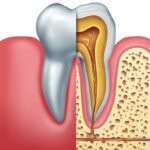Third molars, or wisdom teeth, can offer many benefits when they are correctly positioned and allowed enough space to erupt from the gums.
Here are the benefits of keeping wisdom teeth :
Benefits of keeping wisdom teeth:
- Better jaw function: Wisdom teeth that are correctly positioned and functioning can support the neighboring teeth and assist in keeping the jaw in normal alignment. You can avoid jaw joint troubles and other problems with your bite and jaw alignment.
- Better dental hygiene: Because wisdom teeth are positioned at the rear of the mouth and are less likely to be impacted by crowding and overlapping than other teeth, they can be simpler to clean and maintain than other teeth.
- Improved oral aesthetics: By filling in gaps and making the mouth appear more symmetrical, wisdom teeth might occasionally make someone’s smile look better. A person’s confidence and self-esteem may benefit from this.
- Preservation of dental structure: Wisdom teeth can assist in preserving the jaw’s and the teeth around it, keeping them in regular positions and preventing other teeth from moving or being out of place.
- Lessening the need for orthodontic therapy: Since wisdom teeth can help avoid crowding and enhance the general balance of the bite, in certain situations, maintaining them can lessen the need for orthodontic treatment, such as braces or retainers.
These advantages, however, are not guaranteed and may vary depending on some variables, including the wisdom teeth’s location and alignment, the presence of additional dental issues, and the person’s general oral health.
It could be advised to have wisdom teeth extracted if they are causing a person discomfort, swelling, infection, or impaction.
It’s crucial to remember that not all wisdom teeth usually erupt and frequently lead to issues, including discomfort, infection, and tooth decay. If so, your dentist could advise having the wisdom teeth removed.
It’s always preferable to speak with a dentist to decide what steps to take in your particular scenario.
Wisdom teeth myths:
Here are some widespread wisdom teeth myths:
- The presence of wisdom teeth is unique to humans: While some species, including some primates, have third molars, not all species have wisdom teeth.
- Problems with wisdom teeth are constant: Although wisdom teeth can get impacted or infected and create complications, many people never have any problems with their wisdom teeth.
- The wisdom teeth are relics: Although it’s a widely held misconception, this is untrue.
- While it’s true that some people can’t fit their wisdom teeth in their mouths, this doesn’t suggest that they are vestigial or unnecessary.
- Your wisdom teeth must be extracted: Although it’s a routine treatment, not everyone has to have their wisdom teeth removed.
- If wisdom teeth are healthy and not creating any issues, they may occasionally be preserved.
- Poor breath is a sign of wisdom teeth, although this is not always the case. Bad breath may be a symptom of wisdom teeth becoming infected or impacted. Many people with third molars seldom or never develop foul breath as a result.
These are some of the most widespread fallacies concerning wisdom teeth, but it’s better to speak with a dental expert to precisely evaluate your particular condition.
Pros and cons of keeping wisdom teeth:
Third molars, or wisdom teeth, can have both advantages and downsides.
Pros and cons of keeping wisdom teeth include the following:
Pros:
- Functionality: If the wisdom teeth are in the correct position and have room to erupt through the gums, they can increase the mouth’s chewing surface and facilitate biting and chewing.
People with a narrow jaw or a history of tooth crowding may find this very helpful.
- Prevent Crowding: Wisdom teeth can contribute to preserving the natural spacing between the rest of the teeth in the mouth, which can help prevent crowding.
The wisdom teeth push the other teeth apart when they erupt, helping to maintain the other tooth’s proper alignment.
- Orthodontic Advantages: In some situations, wisdom teeth might assist in correcting orthodontic issues.
By leveling the jaw and spreading the power of biting, for instance, wisdom teeth can assist in curing an overbite.
- No Replacement Needed: Wisdom teeth don’t require dental implants or dentures to be replaced, unlike other teeth that are removed.
Time, money, and suffering may be saved in this way.
- Natural Teeth: By keeping wisdom teeth, a person may avoid getting dental implants or other types of artificial teeth.
Natural teeth can give a more natural feel and appearance and are often simpler to clean and maintain.
Cons:
- Impaction might occur when wisdom teeth do not fully have enough space to erupt from the gums.
- When this happens, the wisdom teeth may irritate the nearby teeth and cause discomfort, swelling, infection, and damage.
- Properly cleaning wisdom teeth can be challenging, which raises the risk of tooth decay and gum disease. Impacted wisdom teeth can also increase the risk of gum disease and dental decay. Wisdom teeth can occasionally crowd other teeth, resulting in orthodontic issues.
- It’s crucial to remember that every individual is different, and wisdom teeth can have a wide range of effects. Based on your unique situation, your dentist or oral surgeon can help you decide whether maintaining or extracting your wisdom teeth is the right course for you.












